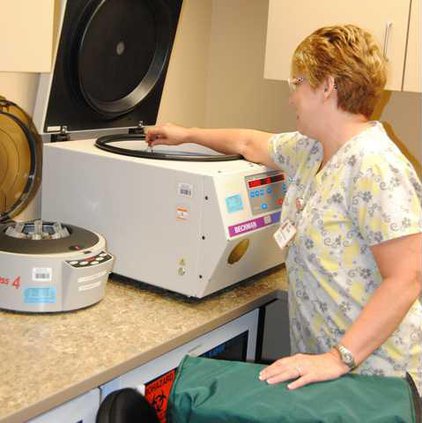Karen Stewart, medical lab technician, is part of the team that has been working to reactivate St. Rose Health Center’s blood-screening program. Those efforts will start paying off Saturday, Aug. 22.
“With all the transitions here at St. Rose, our community blood screenings had to be put on hold for a while,” Stewart said. “But now we can start again and offer a screening every month.
“I am eager to see all the familiar faces and welcome newcomers,” she added. “This is a great, affordable way to monitor your health.”
The screenings are scheduled for 6:30 to 10 a.m. on the fourth Saturday of the month, with the exception of holidays. The other dates this year are Sept. 26, Oct. 24, Nov. 21 and Dec. 19.
Services include a blood profile for $25. The profile includes a complete blood count; comprehensive chemistry that analyzes more than 20 blood chemistries including electrolytes, liver enzymes and kidney functions; lipid profile for a breakdown of cholesterol numbers and triglycerides; and a thyroid test.
Fasting for 10-12 hours before a blood profile is strongly recommended.
However, fasting isn’t necessary for the two other blood tests that are offered - a PSA test that checks a man’s prostate and the HGBA1C test for diabetes.
The prostate test costs $16 and the diabetes screen is $7.50. “I haven’t seen prices this affordable anywhere,” Stewart said.
While the cost is an important consideration, the technician added, a blood test can help prevent or alleviate problems down the road.
“For instance, I know some men who have participated in our community screenings and discovered they had prostate cancer,” Stewart said. “They caught it at an early stage.”
Diabetics and those concerned with cholesterol oftentimes want to be checked more often than Medicare and other insurance allows. They want regular screenings so they can monitor their health throughout the year, she noted.
Mark Mingenback, St. Rose corporate health consultant, agreed with Stewart by saying that “blood work is the roadmap for overall health. The community wanted this program and now we are in a position to oblige.”
The screenings also fit in nicely with St. Rose’s WellnessWorks initiative, Mingenback commented.
“Health-care reform encourages people to become more engaged in preventing illness,” he said. “Some insurance companies even offer financial incentives, depending on your plan. If you can prove your cholesterol is in the healthy range, for example, it could have an effect on your insurance premium.”
Mingenback outlined a few other details about the new program.
Use the new St. Rose parking lot west of St. Rose, across from the convent.Volunteers will direct participants to their destination.No doctor referral is needed; no appointment is necessary.A short form can be completed at St. Rose or online by visiting www.strosehc.com.Results will be mailed 5-7 business days after the screening.Patients can give the results to their doctor if they choose.Cash and checks will be accepted.
“We are trying to make this as convenient and affordable as possible,” Mingenback summarized. “We encourage local and area residents to participate and take an active role in their health care.”
St. Rose specializes in primary care, prevention and wellness. Services include St. Rose Family Medicine, Convenient Care Walk-in Clinic, Great Bend Internists, imaging, infusion clinic, WellnessWorks, one-day surgical procedures, Golden Belt Home Health & Hospice and a comprehensive Specialty Clinic. St. Rose is co-owned by Hays Medical Center and Centura Health.








